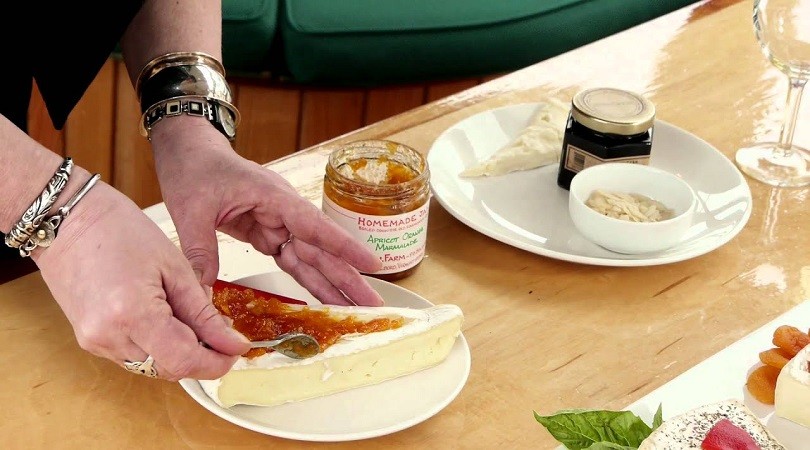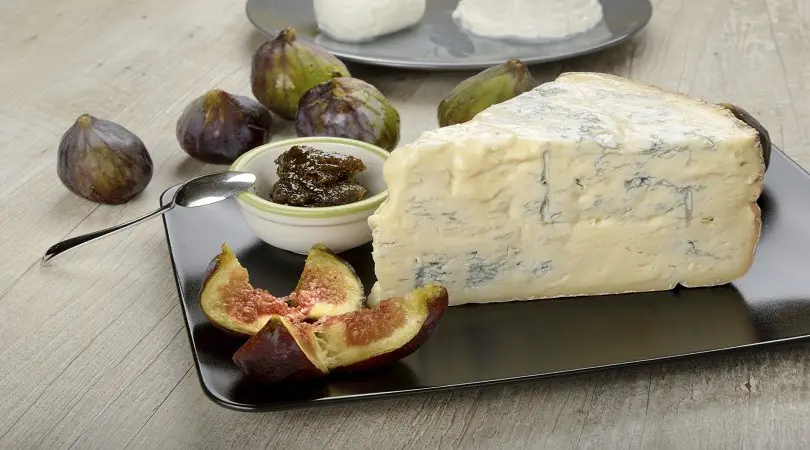Last Updated on January 6, 2025
Yes, it is safe to eat brie cheese while pregnant. Here’s why: During pregnancy, many women are concerned about what foods they can safely consume.
One such food is brie cheese, a soft and creamy cheese enjoyed by many. The worry with brie cheese revolves around the potential risk of listeriosis, a foodborne illness caused by the bacteria Listeria monocytogenes. However, the good news is that brie cheese is safe to eat during pregnancy when it is made from pasteurized milk.
Pasteurization kills harmful bacteria, including Listeria, making the cheese safe for consumption. It’s important to read labels and confirm that the brie cheese is made from pasteurized milk. By ensuring this, pregnant women can still enjoy the delicious taste of brie cheese without any worry.

Is It Safe To Consume Brie Cheese During Pregnancy?
Brie cheese consumption during pregnancy is not recommended due to the risk of listeria contamination. It’s important to prioritize the safety of the baby and choose alternative cheese options that are considered safe for pregnant women.
Overview Of The Safety Concerns Surrounding Brie Cheese During Pregnancy
During pregnancy, it’s important to be cautious about the foods we consume to ensure the safety of both the mother and the baby. Brie cheese, a soft and creamy cheese with a distinctive flavor, often raises questions regarding its safety for pregnant women.
Let’s take a closer look at the potential risks associated with consuming brie cheese during pregnancy and the factors to consider when making your food choices.
Explaining The Potential Risks Associated With Consuming Brie Cheese
Brie cheese, like other soft cheeses, can potentially harbor harmful bacteria called Listeria monocytogenes. While Listeria infections are rare, they can have serious consequences during pregnancy. The risks associated with consuming brie cheese contaminated with Listeria include:
- Increased risk of miscarriage or stillbirth.
- Higher likelihood of developing blood infections.
- Possibility of passing the infection to the baby, leading to health complications.
Importance Of Proper Food Handling And Preparation
To minimize the risks associated with brie cheese consumption during pregnancy, it is crucial to follow proper food handling and preparation practices. Here are some important measures to keep in mind:
- Choose pasteurized brie cheese: Opt for brie cheese made from pasteurized milk, as the pasteurization process helps eliminate harmful pathogens.
- Check the label: Always check the label of the brie cheese packaging to ensure that it is made from pasteurized milk. Avoid unpasteurized or raw milk cheeses during pregnancy.
- Store and refrigerate properly: Keep the brie cheese refrigerated at or below 40°F (4°C) and consume it before the expiration date indicated on the packaging.
- Serve it hot: When enjoying brie cheese, make sure it is thoroughly heated, reaching an internal temperature of 165°F (74°C), as this kills any potential bacteria.
- Avoid cross-contamination: Use separate utensils and cutting boards for brie cheese to prevent cross-contamination with other foods that may carry harmful bacteria.
By adhering to these guidelines, you can minimize the potential risks associated with consuming brie cheese while pregnant.
While Brie Cheese May Be A Delicious Treat, It’S Essential To Take Precautions When Consuming It During Pregnancy. Opt For Pasteurized Brie Cheese, Ensure Proper Storage And Handling, And Thoroughly Heat It Before Consumption. By Following These Recommendations, You Can Safely Enjoy Brie Cheese As Part Of A Balanced Diet During This Special Time In Your Life. Remember, Always Consult With Your Healthcare Provider Regarding Any Specific Concerns Or Dietary Restrictions During Your Pregnancy Journey.

The Risks Of Brie Cheese During Pregnancy
Pregnant? Wondering if you can indulge in Brie cheese? Learn about the risks and make an informed choice.
Brie cheese is a popular choice among cheese enthusiasts for its creamy texture and rich flavor. However, when it comes to food safety during pregnancy, there are certain risks that need to be considered. In this section, we will delve into the presence of Listeria monocytogenes in brie cheese, explore the potential consequences of listeriosis during pregnancy, and provide statistics and research on the prevalence of listeriosis cases.
Highlighting The Presence Of Listeria Monocytogenes In Brie Cheese:
- Brie cheese, a soft cheese made from cow’s milk, has been associated with the presence of Listeria monocytogenes.
- Listeria monocytogenes is a bacterium that can cause listeriosis, a serious infection, especially in pregnant women.
- The moist environment and pH of brie cheese provide favorable conditions for the growth and survival of Listeria monocytogenes.
- It is important to ensure that brie cheese is made from pasteurized milk as unpasteurized milk can harbor harmful bacteria, including Listeria monocytogenes.
Exploring The Potential Consequences Of Listeriosis During Pregnancy:
- Listeriosis, if contracted during pregnancy, can lead to severe complications for both the mother and the unborn baby.
- Pregnant women are at a higher risk of developing listeriosis due to changes in their immune system, making them more susceptible to infections.
- Listeriosis can potentially result in miscarriage, stillbirth, premature delivery, or life-threatening infections in newborns.
- Symptoms of listeriosis may include fever, muscle aches, nausea, diarrhea, and can mimic common pregnancy discomforts, making diagnosis challenging.
Providing Statistics And Research On The Prevalence Of Listeriosis Cases:
- According to the Centers for Disease Control and Prevention (CDC), pregnancy-associated listeriosis occurs in approximately 17% of all reported listeriosis cases in the United States.
- Although rare, listeriosis is more likely to occur during pregnancy compared to the general population.
- Recent studies have shown that listeriosis rates have been increasing in pregnant women, highlighting the importance of food safety precautions during this time.
- It is crucial for pregnant women to be aware of the potential risks and take necessary precautions to protect themselves and their unborn babies.
Remember, when it comes to brie cheese and pregnancy, it’s essential to prioritize the safety and well-being of both mother and baby. By understanding the risks associated with Listeria monocytogenes in brie cheese, exploring the potential consequences of listeriosis, and staying informed about the prevalence of listeriosis cases, pregnant women can make informed choices regarding their diet and minimize the chances of any complications.
Always consult with your healthcare provider for personalized advice during pregnancy.
Safe Consumption Practices For Brie Cheese During Pregnancy
Are you wondering if it’s safe to eat Brie cheese while pregnant? It’s important to follow safe consumption practices to reduce the risk of foodborne illnesses.
Brie cheese is a popular choice for cheese lovers, but as an expectant mother, you may have concerns about its safety during pregnancy. While it’s important to exercise caution and make informed choices, there’s good news: you can enjoy brie cheese while pregnant by following safe consumption practices.
Here are some key guidelines to keep in mind:
Explaining The Importance Of Selecting High-Quality, Pasteurized Brie Cheese
To ensure the safety of both you and your baby, it’s crucial to choose high-quality brie cheese that has been pasteurized. Pasteurization is a heat treatment process that kills harmful bacteria, making the cheese safe for consumption. Look for labels that clearly indicate the cheese is made from pasteurized milk.
By selecting this type of brie cheese, you significantly reduce the risk of foodborne illnesses.
Providing Tips For Safely Storing Brie Cheese To Prevent The Growth Of Harmful Bacteria
Proper storage practices are essential to prevent the growth of harmful bacteria in brie cheese. Follow these tips to maintain the freshness and safety of your brie cheese:
- Store brie cheese in the refrigerator at a temperature below 40°F (4°C). This helps slow down the growth of bacteria and preserve the cheese’s quality.
- Keep brie cheese in its original packaging until you’re ready to consume it. The packaging is designed to protect the cheese and maintain its freshness.
- Once the package is opened, tightly wrap the remaining brie cheese in plastic wrap or aluminum foil. This helps prevent contamination and maintain its moisture.
- Store the wrapped brie cheese in a separate container or on a plate to avoid cross-contamination with other foods in the refrigerator.
- Consume the brie cheese within a week of opening it. As time passes, the cheese becomes more susceptible to bacterial growth.
Discussing The Appropriate Cooking Methods To Eliminate Potential Pathogens
Cooking brie cheese thoroughly can help eliminate potential pathogens that may be present. Here are a few cooking methods that you can use to ensure safety:
- Bake: Preheat your oven to 350°F (175°C) and place your brie cheese in a baking dish. Bake for about 15-20 minutes or until the cheese is fully melted. Cooking at this temperature helps eliminate harmful bacteria while maintaining the delicious taste.
- Grill: If you prefer a smoky flavor, consider grilling your brie cheese. Preheat the grill to medium heat and place the cheese on a heat-resistant dish. Grill for approximately 5-7 minutes, or until the cheese is melted and slightly bubbly.
- Cook in dishes: Incorporate brie cheese into cooked dishes, such as casseroles or pastas. The heat during the cooking process will ensure that any potential pathogens are eliminated. Just make sure the dish is cooked thoroughly before consumption.
By adhering to these safe consumption practices, you can enjoy brie cheese during pregnancy without compromising your health or the well-being of your baby. Remember to always prioritize quality, proper storage, and appropriate cooking methods for a worry-free culinary experience.
Frequently Asked Questions
Is All Brie Cheese Pasteurized?
Yes, all brie cheese is pasteurized.
Can I Have Brie Cheese In 2Nd Trimester?
Yes, it is safe to have brie cheese during the 2nd trimester of pregnancy.
What Cheeses Should You Avoid While Pregnant?
Avoid soft, unpasteurized, blue-veined, and mold-ripened cheeses during pregnancy for safety.
Can I Eat Brie At 37 Weeks Pregnant?
Yes, it is safe to eat brie at 37 weeks pregnant, as long as it is pasteurized.
Can You Eat Brie Cheese While Pregnant?
Yes, you can eat brie cheese while pregnant as long as it’s made from pasteurized milk.
Conclusion
Enjoying brie cheese during pregnancy can be safe as long as it is made from pasteurized milk. The risk of contracting Listeria, a harmful bacteria found in unpasteurized cheese, is significantly reduced with pasteurization. However, it is vital to check the label or ask the producer to ensure the cheese is made from pasteurized milk.
Pregnant women should also be mindful of their overall diet and focus on consuming a variety of nutritious foods. This means incorporating foods rich in vitamins, minerals, and protein to support both their health and the development of their baby.
As always, consulting with a healthcare professional is essential for personalized advice based on individual health needs. They can provide specific recommendations and address any concerns related to eating brie cheese or other foods during pregnancy. With proper precautions and guidance, pregnant women can continue to enjoy a wide range of foods, including a delicious serving of brie cheese.











